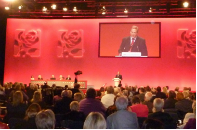 Suggested contemporary issues for Labour Party Conference 2011
Suggested contemporary issues for Labour Party Conference 2011
Labour CND has drafted three contemporary issues, on Trident, Libya and Afghanistan which you are welcome to amend as necessary for your CLP.
Your CLP can submit one contemporary issue, of ten words, with a supporting statement of up to 250 words.
You must submit your contemporary issue by 12 noon on Friday 16th September.
If your CLP does submit a contemporary issue on one of these subjects, please do let us know by emailing info@labourcnd.org.uk.
SUGGESTED ISSUE 1:
Scrap Trident and its replacement, support a Nuclear Weapons Convention
We note the view of the Commons Defence Committee, in its report of 3rd August 2011, that the Strategic Defence and Security Review was ‘unfinished business’.
The Chair of the Committee, James Arbuthnot, stated that the review was ‘rushed and done without proper consultation’ whilst Labour Shadow Defence Secretary, Jim Murphy, said ‘The decisions made in the review now clearly need themselves to be reviewed.’
The Trident nuclear weapon system was excluded from consideration in the Strategic Defence and Security Review process, with its future guaranteed in the final report, yet the National Security Strategy confirms a nuclear weapon system does not address our real defence and security threats.
Conference believes that Trident should not be replaced and that the existing system should be scrapped.
The achievement of a global Nuclear Weapons Convention – banning all nuclear weapons – should become a major objective of an incoming Labour government’s foreign policy.
Supporting statement: 149 words
SUGGESTED ISSUE 2:
UK forces should withdraw from Afghanistan immediately and unconditionally
Conference regrets the tragic loss of life in the attack on the British Council in Kabul on 19th August on the 92nd anniversary of Afghan independence from the UK in 1919.
Conference further notes the UN Assistance Mission in Afghanistan July report which stated the 1462 conflict-related Afghan civilian deaths over the first six months of 2011 represented a 15% increase compared to the same period in 2010.
The number of UK troops killed since 2001 now stands at 379, including 32 this year.
The Commons Defence Committee estimated in July that the cost of UK military operations in Afghanistan was more than £18bn, according to Ministry of Defence figures.
Conference resolves that the UK should withdraw its troops from Afghanistan immediately and unconditionally and encourage the United States and NATO to do likewise.
Supporting statement: 134 words
SUGGESTED ISSUE 3:
Labour condemns UK military intervention in Libya’s civil war
The military intervention by NATO in Libya’s civil war has caused needless death and destruction.
The UN Secretary-General Ban Ki Moon has expressed deep concern at reports of unacceptably large number of civilian casualties. On 12th August he stated that there can be no military solution to the Libyan crisis and that ‘a ceasefire linked to a political process … is the only viable means to achieving peace and security in Libya.’ Amnesty International has called for an investigation into the deaths of 85 civilians following a NATO airstrike near Zlitan on Monday 10th August.
We are concerned at reports on 28th August from NATO sources that Britain may have deployed troops in Libya, contrary to government policy.
Labour Shadow Foreign Secretary Douglas Alexander has stated the UK ‘would not be entitled to a mandate to pursue armed regime change’ yet the UN resolution 1973 has been used to pursue the illegal objective of regime change.
The concerns at mission creep, expressed by many Labour MPs, have been well-founded, including Shadow Defence Secretary Jim Murphy warning against an ‘escalation of the conflict’ as the UK announced new commitments of military resources.
Conference demands an end to NATO’s military intervention in Libya and UK participation in it.
We call for a lasting ceasefire and urge the UN to facilitate negotiations with all the people of Libya for a peaceful settlement to include reparations from NATO for civilian casualties.
Supporting statement: 237 words

